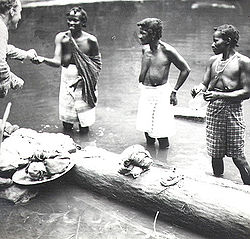
Ndyuka people
Encyclopedia

Maroon (people)
Maroons were runaway slaves in the West Indies, Central America, South America, and North America, who formed independent settlements together...
ethnic group
Ethnic group
An ethnic group is a group of people whose members identify with each other, through a common heritage, often consisting of a common language, a common culture and/or an ideology that stresses common ancestry or endogamy...
who live in the Eastern part of Suriname
Suriname
Suriname , officially the Republic of Suriname , is a country in northern South America. It borders French Guiana to the east, Guyana to the west, Brazil to the south, and on the north by the Atlantic Ocean. Suriname was a former colony of the British and of the Dutch, and was previously known as...
and speak the Ndyuka language. They are often subdivided into the opu, who live upstream of the rivers of Eastern Suriname, and the bilo, who live downstream.
They further subdivide themselves into fourteen matrilinear kinship groups called lo.
The Ndyuka and related people are of African descent, having been shipped as slaves to Suriname about 300 years ago to work on English colonial plantations. Those who escaped, fled deep into the rainforests where they established communities along rivers in eastern Suriname and parts of neighboring French Guiana
French Guiana
French Guiana is an overseas region of France, consisting of a single overseas department located on the northern Atlantic coast of South America. It has borders with two nations, Brazil to the east and south, and Suriname to the west...
and where their culture adopted elements of Native American
Indigenous peoples of the Americas
The indigenous peoples of the Americas are the pre-Columbian inhabitants of North and South America, their descendants and other ethnic groups who are identified with those peoples. Indigenous peoples are known in Canada as Aboriginal peoples, and in the United States as Native Americans...
cultures.
On 10 October 1760, the Ndyuka signed a treaty with the Dutch colonizers, who allowed them territorial autonomy. 10 October is still a day celebrated among some Surinamese Maroons.
In the last decades of the 20th century a large number of the Ndyuka people have moved from their ancestral villages to the coast, especially in and around Paramaribo
Paramaribo
Paramaribo is the capital and largest city of Suriname, located on banks of the Suriname River in the Paramaribo District. Paramaribo has a population of roughly 250,000 people, more than half of Suriname's population...
, the country's capital.

